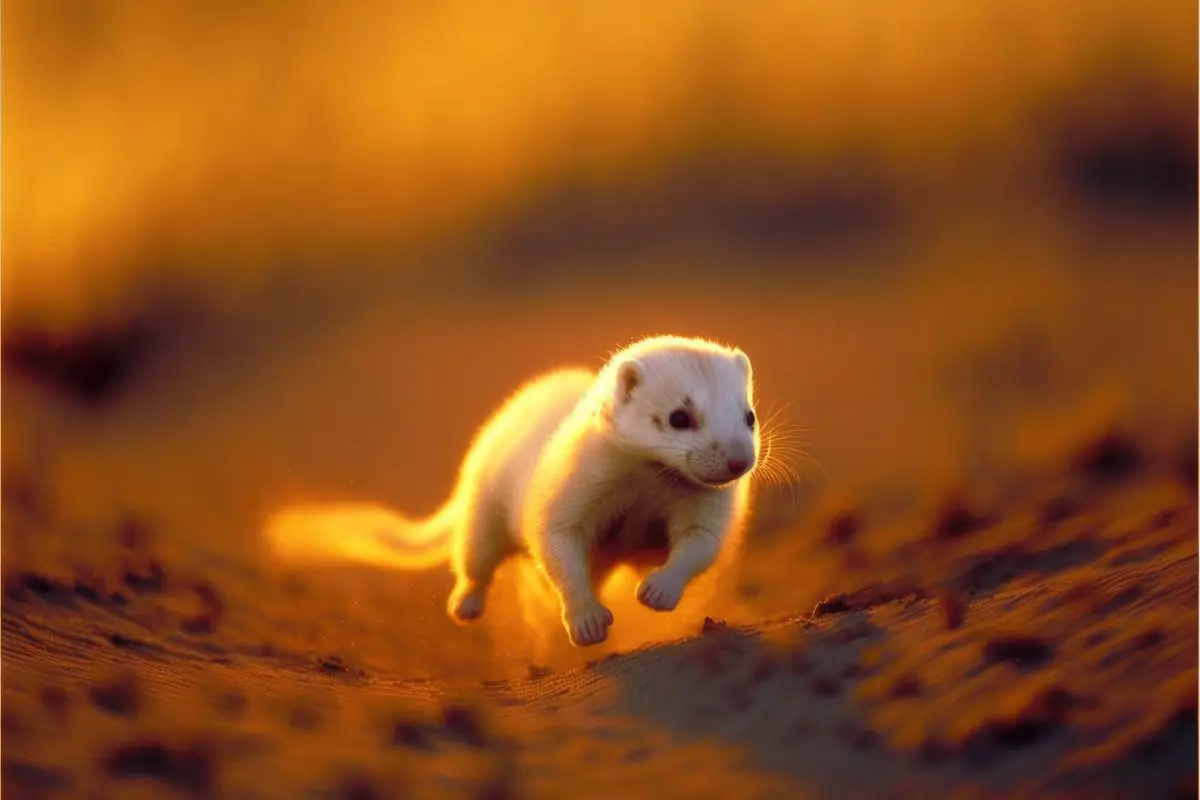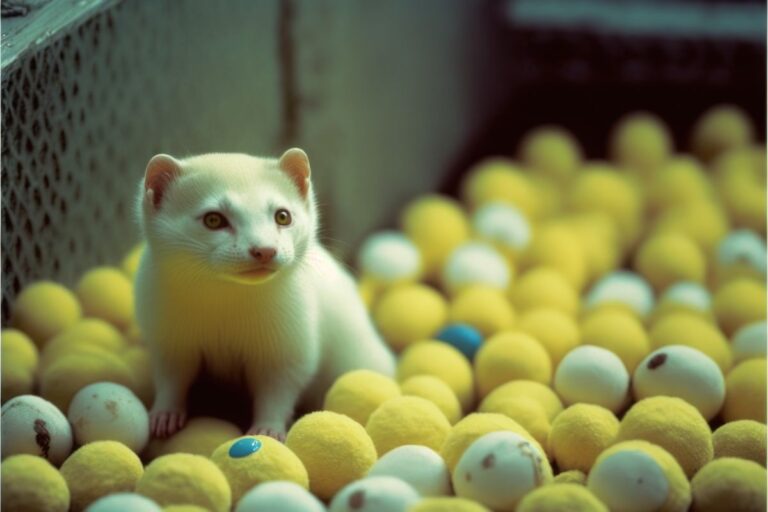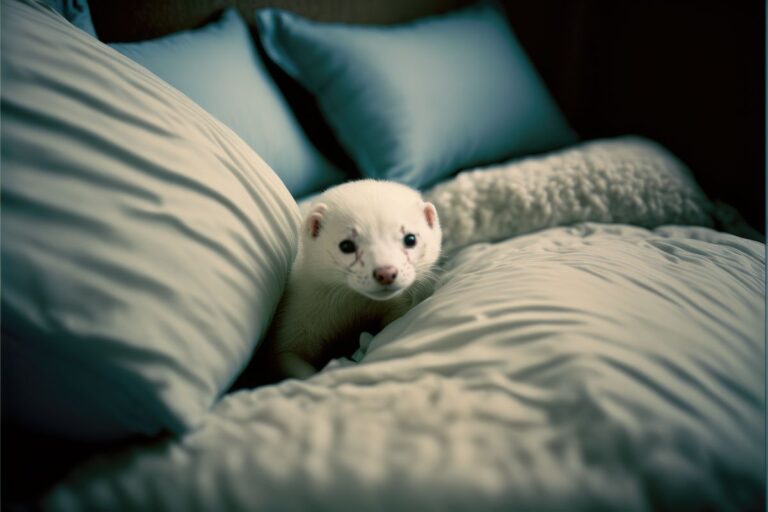Ferret Facts. The Complete Guide

Ferrets are adorable and social. It is one of the many reasons why they have become popular as pets over the years. Do not get me wrong, ferrets have been domesticated for thousands of years. Some Greek philosophers talk about ferrets and this date back to 350 BCE and 450BCE. In this article, we will look at the ferret origin and history and other ferret facts.
Several theories explain the origin of ferrets. The black-footed ferret was first introduced in human homes to hunt down pests. It is said that ferrets belong to the same class as European polecat. In that essence, ferrets are similar to the Europeans. Another theory claim that ferrets came from North Africa. However, this lacks any certainty of supporting documents.
The domestication history of ferrets
The domestication of ferrets dates back to 2500 years ago. They were introduced in human homes for the purpose of eliminating pests. While cats and dogs were initially the hunters of rodents and rabbits, they were not efficient.
Dogs and cats are a little larger than ferrets. Therefore, they could not fit in the small burrows to retrieve rats and mice. Ferrets, on the other hand, are fast, smaller and will get these pests from underground.
People started keeping them as pets in Europe and Ancient Greece. Sailors were responsible for the worldwide spread of ferrets. Once again, they found dogs and cats inefficient to hunt rodents in the ships. Besides, cats would only hunt when they felt like it. On the other hand, bringing dogs in the ships meant sailing with constant barking.
The efficiency of ferrets as rodent and rabbit hunters spread around the world. In the 1860s, New Zealand became infested with rabbits. They destroyed crops for so many times until, in 1880, ferrets were released in farm fields.
While this worked to eliminate the rabbits, ferrets also posed a danger to the native birds of New Zealand. Most of these birds could not fly and thus ferrets would also eat them. Some birds went completely extinct after the release of the ferrets.
To date, New Zealand still hosts wild ferrets in the forests. This also experimented in other countries until people started keeping ferrets as domesticated pets. Australia also used ferrets to overcome rabbit infestation. However, there aren’t as many wild ferrets in Australia since the weather is cruel and there are a lot of predators feeding on ferrets.
Ferret habitat and living conditions
Ferrets belong to the weasel family. In the wild, they live and hunt independently while residing in existing burrows. Due to their need to hunt, ferrets will need a large piece of land to provide food resources. They prefer living in grasslands, occupying existing burrows and tunnels.
The black-footed ferret (wild ferrets) became extinct in North America. They were however reintroduced in the forests in 2006.
Now, the domesticated ferrets lead a different lifestyle. They live in our homes, in cages. As with any other pet, you must be prepared to feed and care for your ferret. One of the most interesting facts about a ferret is that they are self-sufficient.
Before you get a ferret, you must purchase and install a ferret cage. Ferrets are swift and can run off out the door in a flash. You need to have them contained and also provide a place just for him. The cage should be spacious with small gaps; smaller than he can fit in.
Inside the cage, you should also have a food station. Place a food bowl and drinking water, away from the litter box area. At the same time, you need to make a sleeping place for your ferret. We will discuss the ferret diet later on in this article.
My advice is to get a cage specifically made for ferrets. Understand that you will need to clean the cage, preferably on a weekly basis.
Ferret behavior
Wild ferrets are more of nocturnal animals while domesticated ones are crepuscular. The black-footed ferret will roam the forests at night, tracing and hunting down prey. They will sleep for most of the day.
You can be able to adjust the sleeping schedule of your ferret at home. Well, this is because they do not have to hunt for food. Nevertheless, domesticated ferrets will need 18-22 hours of sleep. During winter, some ferrets will sleep soundly for 6 hours straight.
On the other hand, wild ferrets can hibernate for over a week during winter, and especially in the Northern Hemisphere.
As I mentioned above, domesticated ferrets are not only adorable but also very social. They love playing and hence you must provide a ferret-proofed area for that. They need at least 4 hours out of the cage to run around and burn excessive energy.
Unlike owning a dog or a cat, ferrets are quieter and do not become neurotic. They have no problem living on their own as long as you provide all the Necessities they need. The fact that a ferret will not get bored, or develop anxiety problems makes them a great choice of pet to live with.
The ferret diet
Ferrets are strict carnivores and will only feed on foods with high protein and fat content. As I have previously mentioned, ferrets are originally hunters. The wild diet of fresh prey meets every requirement of a ferret diet.
In the wild, ferrets will chase and hunt down rodents, rabbits and even birds for food. However, the domesticated ferret does not have the privilege to hunt. Luckily, there is special food for ferrets that you will find in the pet stores.
The dry food is usually comprised of chicken and meat as ingredients. However, some ferret owners will go for a raw ferret diet. Due to various reasons, it is safe to give your ferret pre-killed frozen prey or raw meat. The prey could /be a mouse, rabbit, or chicks.
While wild ferrets are known to eat fish and even reptiles, I advise against feeding fish to ferrets. This can make the ferret smell bad. Ferrets are also heavy feeders. In the wild, they will kill more than 5 times a day.
At home, you will need to provide a constant supply of food. You may invest in another food station or a multi-level cage. They feed a lot because of their short digestive tract which results in a faster metabolism rate.
You should not have any problems finding ferret food in the pet stores.
Reproduction Ferret facts
In most cases, ferrets are spayed or neutered before they are adopted. However, in the wild, ferrets go in heat between March and April. When a female ferret goes in the heat for the first time, they stay that way until they mate and become pregnant.
They will have a gestation period of not less than 35 days and not more than 45 days. After this, they will deliver and nurse the litter for 6 weeks before they can become completely independent. At this age, the kits are already sexually mature and can fend for themselves.
Breeding domesticated ferrets are, however, a risky and difficult process. Unless you are doing it professionally, I suggest you get your ferret pet spayed before she hits sexual maturity. Your vest should be able to help you with this.
However, if you are still convinced to breed your ferret, you will need professional advice. Get help from someone who has done it before, as it can be tedious from mating to nursing care. I have previously outlined a step by step guide to breeding ferrets.
Neutering a male ferret will also reduce the musky smell associated with ferrets. Well, if you are not planning to breed your ferret, my advice is to get them sterilized.
Other must-know ferret facts
Ferrets are playful and social
While the ferret temperament is nowhere near that of a cat or dog, they are incredibly social. Earlier on, I mentioned that ferrets need some time to play outside the cage. This should always be under your supervision and with the doors closed.
You can engage with your ferret in different games. For instance, you can chase each other in a ferret-proofed area. Also, engage in stimulating games such as stair climbing. You might need to train him how to, even though ferrets are excellent climbers.
Ferrets dance when threatened or excited
Another interesting ferret fact is that ferrets also engage in the ‘weasel war dance.’ This is a dance where a ferret will jump up, roll over and dart his body. It will happen when you probably let him out of the cage.
Wild ferrets use this dance to scare and confuse prey at the same time. It is more of a canning personality that will get the prey to stop running and watch then instead. While this happens, the ferret will pick a perfect moment to pounce and kill his prey.
Well, new scents, probably if you come home from a run, can get a ferret very excited. If you get him out of the cage immediately, you might see him dancing all around. It could be playful or a sign that your ferret can smell danger around them.
Ferrets have a long lifespan
A ferret will lead a normal healthy life for about 7 years. In some cases, some ferrets have lived for up to 12 years. However, in the wild, many ferrets do not get to live this long. I mean, there is the danger posed by unfavorable weather conditions. At the same time, there are predators in the wild that could hunt them down.
Domesticated ferrets will live under great conditions. I mean, they get warm beddings, great quality of food and attention. Furthermore, we control serious illnesses in ferrets through regular visits to the vet.
Ferrets do not dig their burrows
While ferrets are very good hunters, both on the ground and underground, they do not dig burrows to live in. Instead, they will take over burrows from their target preys. They keep moving from one burrow to another based on the availability of food around them.
However, your pet ferret might show interest in digging up stuff. Get him a sandbox to work his way around it and provide the same stimulation as in the wild.
Always supervise a ferret outside the cage
As I have mentioned multiple times above, ferrets do need some time out of their cages. I always advise ferret owners to only allow this under supervision. It would be a terrible idea to leave a ferret with children unsupervised.
I advise you to let him out of the cage when you have nothing else to do. Be very careful especially if you have children at home. Never let the child and ferret associate without your supervision. Things can get messy between the two.
Ferrets are restricted in some states
Did you know that it is illegal to keep or transport a ferret pet in Hawaii and California? I suggest you understand the state laws about keeping ferrets as pets before you get one. If your area is restricted, then you cannot keep one.
Fun ferret facts
Ferrets are exciting pets, to say the least. They are intelligent, curious and quite playful, which gives them a unique personality. Below is a few fun ferret facts that you may like to know:
- A bunch of ferrets is referred to as a ‘business’
- Ferrets are trainable. It is possible to litter train a ferret among other fun tricks
- Ferrets smell worse when bathed frequently. Stick to bathing him at most once a month
- Ferret specific foods are readily available and at the same time safe and healthy.
- The musky ferret smell is usually a defense mechanism in the wild
Ferrets are extremely exciting and fun to monitor. They will engage in exciting play to get your attention and enjoy themselves. Ferrets are now the third popular pets around the wild after cats and dogs. Have you recently bought a ferret? My suggestion is to understand everything about ferret care and facts.
The only way to keep a pet happy is to understand them completely.






